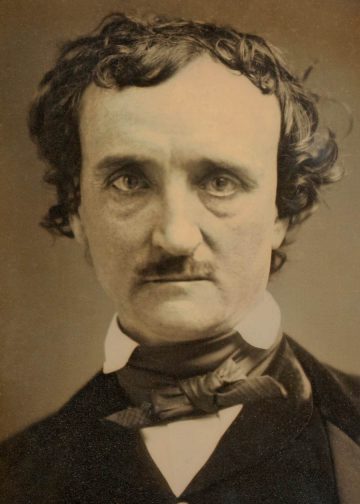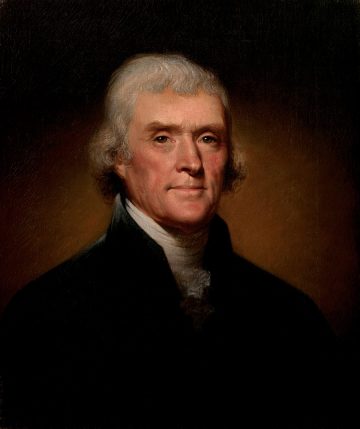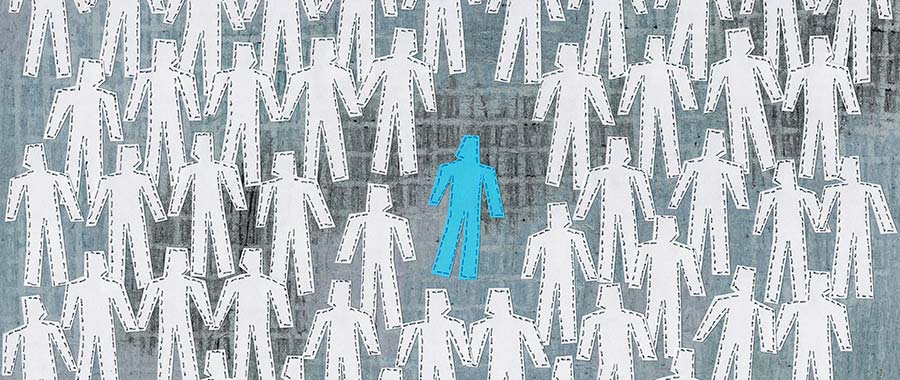The views expressed in our content reflect individual perspectives and do not represent the authoritative views of the Baha'i Faith.
We no longer eat people, either. As difficult as it might be to imagine, eating other humans in time of extreme necessity was once a widely-practiced activity—just like slavery.
Eating others came from the utilitarian calculation that if one life needed to be sacrificed for the benefit of several, that one life would be given or more accurately taken to benefit the whole. This was so well an established tradition that it had its own name “The Custom of the Sea.” The famous American writer Edgar Allen Poe illustrated the practice in his sole complete novel The Narrative of Arthur Gordon Pym of Nantucket. The book, written in 1838, depicts an adventure set at sea where one Richard Parker is sacrificed and consumed to avoid starvation.

Edgar Allan Poe
Ironically, some 46 years later, in the summer of 1883, a man named Richard Parker was similarly constrained when his vessel the Mignonette was shipwrecked off the Cape of Good Hope. The ship’s captain, Tom Dudley, invoked the Custom of the Sea to save the lives of as many as possible. Upon rescue Captain Dudley and first mate Edmund Brooks shared the true account of their travails, including the details of Parker’s murder and consumption for the survivor’s continued existence.
When the ghastly details of the Mignonette got out, there was widespread shock and sympathy. Many saw the episode as a practical, utilitarian calculation, however gruesome. The courts, on the other hand, determined that the men’s actions were morally reprehensible and criminal. After a lengthy trial Dudley and Brooks were found guilty of manslaughter. However, the judge took into consideration their extraordinary circumstances and commuted their sentence to six months.
Captain Dudley went to his grave convinced that he had been wrongly convicted. After all, he believed, “a man has to do what he has to do.” This judgement marked a significant turning point in the application of the categorical imperative superseding individual necessity, and in the legal concept of human rights. Today, international law holds that the individual’s right to life may not be compromised, even if doing so saves more lives than are lost. Human life is too sacred to be consumed, even in instances of extreme need.
In other words, the capacity to adhere to the moral imperative in the face of extreme personal suffering is one of the characteristics that separates men from animals.
The mid-nineteenth century saw a veritable explosion in the advance of virtue over force in the governance of human affairs—in no place more apparent than in the practice of chattel slavery in the United States of America. As abominable as cannibalism may be to imagine today; slavery was much worse. Instead of giving up your life one day for the survival of another, you gave up your life every day, over and over for the rest of your life, for the profit of others.
If it is true that categorical condemnation of cannibalism in England 1883 is a hallmark in human evolution, then the complete abolition of slavery in the United States in 1865 is a monumental triumph of right over might. The American version of chattel slavery is a study in the starkest contrasts of the best and worst of the human condition.
On the one hand, slavery was a well-established and even venerated tradition by the dawn of the 19th century. The institution of slavery, which had deep roots in peculiar prerogatives which its proponents heartily supported, prevailed throughout the known world. Indeed, many of the founding fathers of the United States of America owned slaves and perpetrated despicable deeds upon them, utterly inconsistent with their education, station and ideals.
On the other hand, many enlightened individuals had concluded that slavery, like cannibalism, was barbaric. Thomas Jefferson complained of slavery that “There must doubtless be an unhappy influence on the manners of our people produced by the existence of slavery among us ….”

Thomas Jefferson
As humanity turned to the dawn of a new millennium, more and more individuals and institutions found slavery odious—the same as cannibalism, a practice inconsistent with the hallmarks of true civilization. Some like Thomas Jefferson took tentative and incomplete steps to halt the spread of slavery. For example, he led the Commonwealth of Virginia to ban the importation of slaves in 1778. Further, on March 2, 1807, the United States Congress enacted the Act Prohibiting Importation of Slaves, one of the first steps in an international trend toward abolishing the slave trade.
Nevertheless, it took 87 years and the prosecution of a devastating civil war claiming more than 700,000 victims before the institution of slavery was outlawed in the United States. Indeed, Thomas Jefferson died a slave master, notwithstanding the fact that he knew intimately the pernicious impact of the peculiar institution on the country he helped create.
In this series of articles, we will consider the historical, intellectual and spiritual processes that contributed to the demise of this horrific ancient institution, and our subsequent struggles wrestling with the racist consequences of 245 years of slavery in the United States.
So what changed by the middle of the 19th century to make the prospect of ending the institution of slavery a viability?
Beyond and behind the well-known historical forces we’re all familiar with, two things stand out. Humanity was maturing; and God had sent the world a new prophet, Baha’u’llah, who revealed new teachings commensurate with the demands of humanity on the threshold of its collective maturity. Baha’u’llah, for the first time in human history, brought us a Faith that categorically outlawed slavery and incontrovertibly asserted the oneness of humanity:
It is forbidden you to trade in slaves, be they men or women. It is not for him who is himself a servant to buy another of God’s servants, and this hath been prohibited in His Holy Tablet. Thus, by His mercy, hath the commandment been recorded by the Pen of justice. Let no man exalt himself above another; all are but bondslaves before the Lord, and all exemplify the truth that there is none other God but Him. He, verily, is the All-Wise, Whose wisdom encompasseth all things. – Baha’u’llah, the Most Holy Book, p. 45.
You May Also Like
Comments

















Last night I read, with tears in my eyes, James Baldwin's heartrending words to his nephew in the book "The Fire Next Time": "The really terrible thing, old buddy, is that you must accept them. And I mean that very seriously. You must accept them and accept them with love. For these innocent people have no other hope. They are, in effect, still trapped in a history which they do not understand; and until they understand it, they cannot be released from it. They had to ...believe for many years, and for innumerable reasons, that black men are inferior to white men." This was written in 1963. Still so far to go.